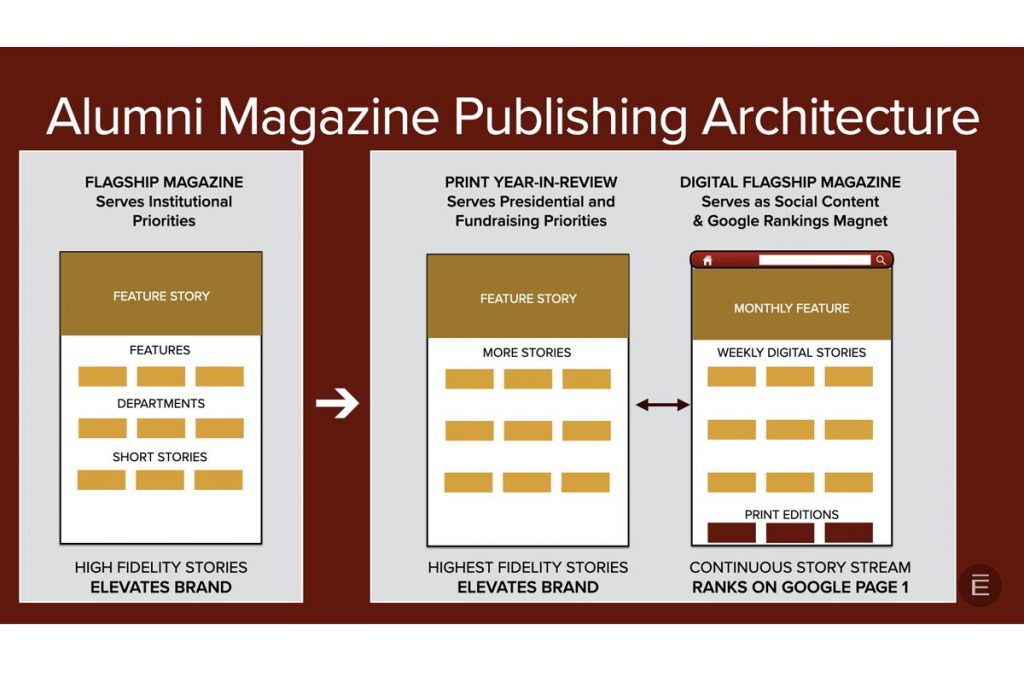| May 5, 2024
SEO Tips for turning an alumni and university magazine into a Google ranking engine

Three distinct eras mark the evolution of alumni magazines. Initially, they were printed and distributed to all living alumni and friends, but concerns over climate change and shifting alumni habits have led even the most prestigious brands to discontinue this practice. The second era saw the rise of digital magazines shared through platforms like ISSUU and flipbooks, but these formats hinder story visibility on search engines like Google. We are now in the third era, marked by a hybrid approach combining digital and print formats. Digital magazines, powered by digital story platforms, offer fresh content weekly, optimized for search engine optimization (SEO) techniques and social sharing. They reach people beyond the alumni and allies in a college network, creating opportunities to form new friendships. However, many digital magazines still struggle to rank on Google, limiting their impact on college reputation, rankings, and enrollment revenue growth.
SEO Tips for Optimizing University Magazine Digital Story Platforms
Turning digital alumni or university magazine into a Google ranking engine involves structural optimization, content optimization, and user experience optimization. Only by completing these carefully do the stories have a chance to elevate institutional visibility on search engine. Here are some practical SEO tips for improving story rankings:
1. Start with a Keyword Guide
Using basic keyword research tools, craft a Keyword Guide that contains clusters of keywords and phrases spanning strategic plan priorities, academic programs, brand ideals, and areas of thought leadership, research, innovation and intellectual capital. Laying claim to the keywords begins with an intentional plan. Categories in the Guide should include academic program and research keywords, brand positioning keywords, thought leadership and reputation keywords, decisioning keywords, and location keywords.
2. Inform magazine department names, categories, tags and editorial calendar with the Keyword Guide
SEO-informed magazine architecture will give your stories the tailwinds that’ll propel them higher on search engines much faster.
3. Always host digital magazine story platform on an .edu domain
Since each college and university can be awarded only one (and occasionally two) .edu domains, search engines generally rank .edu websites higher than other domain extensions (.coms, .nets, .orgs, and others). Always host the digital story platform on an .edu domain.
4. Make the digital story platform responsive, secure and fast
Responsive websites, which automatically adapt to various devices, are favored by both users and Google. Additionally, Google prioritizes websites that load quickly and operate securely, rewarding them with higher rankings.
5. Tell better stories in a variety of formats
Ensure content is well-written, engaging, and valuable for target audiences. Write low, medium and high fidelity stories. Diversify content formats to appeal to different audiences and improve search visibility. Create articles, interviews, videos, infographics, interactives and more.
6. Regularly add new stories
Since content freshness is a Google ranking factor, keep the magazine website regularly updated with fresh content, new stories, consequential news, and event coverage to maintain search visibility and authority. Stick to an editorial calendar but be ready to shift priorities when new story opportunities arise.
7. Optimize all content assets for search engines
Incorporate target keywords naturally into article headlines, subheadings, body text, and image alt text. Optimize copy, images, videos, pdf’s, tables, links, and meta-data on every story page. This will ensure that Google serves up the stories on its various search result channels.
8. Optimize meta tags
Write compelling meta titles and descriptions that include target keywords and encourage clicks from search engine users. Ensure each story has a unique focus keyword and meta description.
9. Optimize schema markup
Implement schema markup to provide search engines with structured data about story content, such as alumni events, university news, and article categories. This can enhance search listings with rich snippets.
10. Activate social signals
Social signals (a webpage’s shares, likes and social media visibility) impact organic rankings. Add them to every story page of the digital story platform. Since search engine bots also process and consider college social media channels as ranking factors, ensure that all stories are optimized and promoted on college social media channels.
11. Increase internal linking judiciously
Since internal linking is a Google ranking factor, link relevant articles and pages within the magazine to improve navigation and spread link equity throughout the site. Highlight related content, alumni profiles, university events, and more. Don’t over-link because it’ll fracture the user experience.
12. Monitor and protect keyword rankings
Measure keyword rankings to ensure college magazine stories rank on Google and rankings are sustained over time. Watch competitors for signs of encroachment, and counter their moves with fresh optimizations on an as-needed basis.
13. Monitor user engagement
Measure story popularity. Focus on metrics like origin of visitors, bounce rate, time on page, and pages per session to improve user engagement. High-quality engaging content, related stories, intuitive navigation can help keep visitors on the website longer, signaling to search engines that story content is valuable.
By implementing these SEO tips, you can transform your alumni or university magazine into a powerful Google ranking engine, driving organic traffic and expanding the visibility of your brand. This will ultimately translate into stronger enrollment revenue, traditional rankings and reputation.
If you are seeking an agency for digitizing your alumni and university magazine, view our higher education marketing agency and SEO capabilities pages and consider partnering with us.
